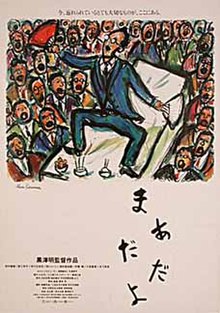Madadayo
| Madadayo | |
|---|---|
 Kurosawa's own artwork | |
| Directed by | Akira Kurosawa |
| Written by | Akira Kurosawa Ishirō Honda (uncredited) Hyakken Uchida (essays) |
| Produced by | Yuzo Irie Yo Yamamoto Hisao Kurosawa |
| Starring | Tatsuo Matsumura Kyōko Kagawa Hisashi Igawa George Tokoro |
| Edited by | Akira Kurosawa |
| Music by | Shin’ichirō Ikebe |
Production company | |
| Distributed by | Toho |
Release date |
|
Running time | 134 minutes |
| Country | Japan |
| Language | Japanese |
| Budget | US$11,900,000 |
Madadayo (まあだだよ, Mādadayo, literally, "Not Yet") is a 1993 Japanese comedy-drama film. It is the thirtieth and final film to be completed by Akira Kurosawa. It was screened out of competition at the 1993 Cannes Film Festival.[1] The film was selected as the Japanese entry for the Best Foreign Language Film at the 66th Academy Awards, but was not accepted as a nominee.[2][3]
Plot
The main story of the film is based on the life of a Japanese academic and author, Hyakken Uchida (1889–1971). The film opens with him resigning as professor of German, in the period immediately before the Second World War. The plot of the film is centered on his relationship with his former students, who care for him in his old age. The title, Not Yet in English, is an allusion to an ancient Japanese legend mentioned in one scene of the film, of an old man who refuses to die. This story is constantly referred to in the movie, as every year on the old man's birthday, his students throw him a party in which they all ask him, "Mada kai?" ("Are you ready?"). He responds by drinking a large ceremonial glass of beer and shouting "Mada dayo!" ("Not yet!"), implying that death may be near, but life still goes on. The movie also covers the events that transpire in between these birthdays, such as his moving into a new house, his discovery of (and loss of) a beloved house cat, etc. As the years progress, the annual celebrations shift from a fraternity party atmosphere to a gathering of families, and the ceremonial large glass of beer that Uchida drinks changes as well, but he always completes his full glass.
Cast
- Tatsuo Matsumura - Professor Hyakken Uchida
- Kyōko Kagawa - Professor's Wife
- Hisashi Igawa - Takayama
- George Tokoro - Amaki
- Masayuki Yui - Kiriyama
- Akira Terao - Sawamura
- Takeshi Kusaka - Dr. Kobayashi
- Asei Kobayashi - Rev. Kameyama
- Hidetaka Yoshioka - Takayama's son
- Yoshitaka Zushi - Neighbor
- Mitsuru Hirata - Tada
- Nobuto Okamoto - Ôta
- Tetsu Watanabe
- Norio Matsui
- Noriko Honma - Old lady holding a cat
Other uses
Madadayo is also the title of a collection of posthumously published essays by Uchida, which forms, together with his other autobiographical works, the background material for the film's screenplay . The portrayal of Uchida in the film might be interpreted as a metaphor for Japan of the Meiji, Taishō and early Shōwa periods, trying to cope with the fast changing world of the later Shōwa period.
Romanization and usage
The official romanization of まあだだよ is not madadayo but mādadayo (the additional あ "a" sound after ま "ma" draws it into a long 'a'). The meaning of the two spellings is the same except that the latter is an expression Japanese children use in the game tag. This usage shows the character with Uchida's humour.
End credits
The artwork during the end credits sequence was painted by the writer/director Akira Kurosawa and is coupled with Antonio Vivaldi's L'estro Armonico Op. 3, Concerto No. 9.
Home video
English-subtitled DVDs have been released by Winstar and the Criterion Collection in the U.S., Madman in Australia, Yume Pictures in the UK, and Mei Ah in Hong Kong. A Blu-ray edition, without English subtitles, is available in Japan as part of a box set with Rashomon, Ran, and The Quiet Duel.[1]
See also
- List of submissions to the 66th Academy Awards for Best Foreign Language Film
- List of Japanese submissions for the Academy Award for Best Foreign Language Film
References
- ^ "Festival de Cannes: Madadayo". festival-cannes.com. Retrieved 2009-08-25.
- ^ Margaret Herrick Library, Academy of Motion Picture Arts and Sciences
- ^ Frook, John Evan (30 November 1993). "Acad inks Cates, unveils foreign-language entries". Variety. Retrieved 25 August 2008.
